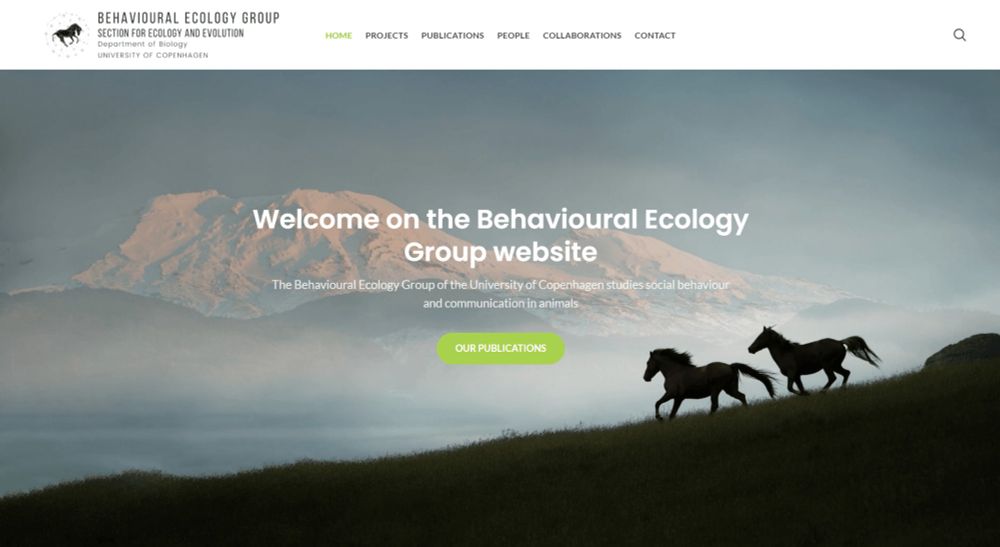

Visit our dedicated website to explore more about our past and ongoing projects.
🔗 behavioural-ecology-group.com
#SciComm #Ethology #Bioacoustics #AnimalCognition #AnimalWelfare #AnimalConservation #AnimalBehavior
Visit our dedicated website to explore more about our past and ongoing projects.
🔗 behavioural-ecology-group.com
#SciComm #Ethology #Bioacoustics #AnimalCognition #AnimalWelfare #AnimalConservation #AnimalBehavior

Visit our dedicated website to explore more about our past and ongoing projects.
🔗 behavioural-ecology-group.com
#SciComm #Ethology #Bioacoustics #AnimalCognition #AnimalWelfare #AnimalConservation #AnimalBehavior
@ediminin.bsky.social @behaveco.bsky.social

@ediminin.bsky.social @behaveco.bsky.social
A new study suggests snorts may lack specific communicative function. However, "pant" calls triggered significant reactions, influenced by sex & social context.
www.behavioural-ecology-group.com/learning-fro...
#SciComm #Bioacoustics
© stanciuc via canva.com

A new study suggests snorts may lack specific communicative function. However, "pant" calls triggered significant reactions, influenced by sex & social context.
www.behavioural-ecology-group.com/learning-fro...
#SciComm #Bioacoustics
© stanciuc via canva.com

A new study validates using citizen science data to predict snaring hotspots in fenced reserves: a novel approach to protect Kruger's carnivores.
Co-authored by former PhD student @damaris-riedner.bsky.social.
#WildlifeProtection #Conservation

A new study validates using citizen science data to predict snaring hotspots in fenced reserves: a novel approach to protect Kruger's carnivores.
Co-authored by former PhD student @damaris-riedner.bsky.social.
#WildlifeProtection #Conservation
@behaveco.bsky.social

@behaveco.bsky.social

Using different machine learning techniques for caller ID can lead to conflicting results, making it hard to compare studies.
A new preprint asks: which analysis pipeline is the most reliable?
📈 Find more at: www.behavioural-ecology-group.com/same-data-di...

Using different machine learning techniques for caller ID can lead to conflicting results, making it hard to compare studies.
A new preprint asks: which analysis pipeline is the most reliable?
📈 Find more at: www.behavioural-ecology-group.com/same-data-di...
#bioacoustics
www.pnas.org/doi/10.1073/...

#bioacoustics
www.pnas.org/doi/10.1073/...
www.sciencedirect.com/science/arti...
We found that carnivores were highly susceptible to being caught in snares & predicted snaring hotspots in Kruger



🐋A novel insight into rorqual feeding plasticity.
Read more at: www.behavioural-ecology-group.com/why-keep-you...

🐋A novel insight into rorqual feeding plasticity.
Read more at: www.behavioural-ecology-group.com/why-keep-you...
@marinemammalsau.bsky.social 🧪

A new study busts the “overabundant macaque” myth, revealing population declines, flawed data, and why intact forests are still essential for these adaptable yet threatened species.
🐒 Read more at: www.behavioural-ecology-group.com/threatened-s...

A new study busts the “overabundant macaque” myth, revealing population declines, flawed data, and why intact forests are still essential for these adaptable yet threatened species.
🐒 Read more at: www.behavioural-ecology-group.com/threatened-s...


New research shows small cetaceans rely on blubber quality, while giants like blue whales benefit from sheer size—lower surface-to-volume ratios mean less heat loss.
🐳 Read more at : www.behavioural-ecology-group.com/size-specifi...

New research shows small cetaceans rely on blubber quality, while giants like blue whales benefit from sheer size—lower surface-to-volume ratios mean less heat loss.
🐳 Read more at : www.behavioural-ecology-group.com/size-specifi...
Discover #MacaqueNet — a global collaboration of 100+ scientists building the first open-access, standardised database of macaque social interactions.
www.behavioural-ecology-group.com/macaquenet-a...

Discover #MacaqueNet — a global collaboration of 100+ scientists building the first open-access, standardised database of macaque social interactions.
www.behavioural-ecology-group.com/macaquenet-a...

A new study published in @royalsociety.org and supervised by @ebriefer.bsky.social reveals that the simultaneous production of two distinct vocal frequencies plays a crucial role in animal communication.
📚 Read more: doi.org/10.1098/rstb...

A new study published in @royalsociety.org and supervised by @ebriefer.bsky.social reveals that the simultaneous production of two distinct vocal frequencies plays a crucial role in animal communication.
📚 Read more: doi.org/10.1098/rstb...
Join @kirstyegraham.bsky.social as they share open-source tools that can enhance our ability to compare bodily communication across species!
📆Saturday, February 22⏰ 5 pm GMT |1 pm EST |10 am PST🔗 Register here:https://rb.gy/fb4rer

Join @kirstyegraham.bsky.social as they share open-source tools that can enhance our ability to compare bodily communication across species!
📆Saturday, February 22⏰ 5 pm GMT |1 pm EST |10 am PST🔗 Register here:https://rb.gy/fb4rer
🚀 Discover how #MATLAB tackles AI challenges like scalability, interpretability & deployment!
⏰ 2:00 PM GMT+1
fr.mathworks.com/company/even...
🚀 Discover how #MATLAB tackles AI challenges like scalability, interpretability & deployment!
⏰ 2:00 PM GMT+1
fr.mathworks.com/company/even...
🚀 Discover how #MATLAB tackles AI challenges like scalability, interpretability & deployment!
⏰ 2:00 PM GMT+1
fr.mathworks.com/company/even...
🚀 Discover how #MATLAB tackles AI challenges like scalability, interpretability & deployment!
⏰ 2:00 PM GMT+1
fr.mathworks.com/company/even...
My colleagues in the Department of Ethology at Eötvös Loránd University (Hungary) are conducting a survey of dog owners. So if you are a dog owner, please consider completing their survey at tally.so/r/nPXKPb.
#dogs

My colleagues in the Department of Ethology at Eötvös Loránd University (Hungary) are conducting a survey of dog owners. So if you are a dog owner, please consider completing their survey at tally.so/r/nPXKPb.
#dogs

